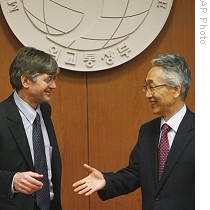Seoul
03 June 2009
High-level American envoys visiting Seoul say they are cooperating with regional allies to dissuade North Korea from the path of nuclear weaponry and back to dialogue aimed at disarmament. The delegation is making stops around Asia for consultations on how to respond to last month's nuclear weapon test by the North.
 |
| US Deputy Secretary of State James Steinberg (L) meets South Korea's Vice Foreign Minister Kwon Jong-rak in Seoul, 03 Jun 2009 |
"We need to take steps to make clear to the North that the path it's on is the wrong one, but that we are prepared, if they are prepared to change course, to enter an effective dialogue that will really lead to the complete and verifiable denuclearization of the Korean peninsula," he said.
Range of options
Steinberg met with South Korean counterparts here in Seoul, Wednesday. It is part of an Asian diplomatic tour with senior U.S. officials representing the Obama administration. He says a "range of options" are being considered to punish North Korea for its nuclear test last month. He says no specific options have been ruled in or out, including financial sanctions targeting North Korean business interests.
Escalating tensions
North Korea's missile test last month was the second in the country's history. It was one of a series of actions that have escalated tensions with the United States and the North's regional neighbors.
Many analysts see Pyongyang's confrontational strategy as an attempt by North Korean leader Kim Jong Il to reassert domestic control and lay the groundwork for a succession of power. South Korea's intelligence agency informed lawmakers Tuesday the North's leader appears to have designated his youngest son as his eventual replacement.
North Korea is now reported to be planning test launches of mid-range missiles, as well as at least one long-range missile, hypothetically capable of reaching the United States. Pyongyang says not only will it not return to talks aimed at getting rid of its nuclear weapons, but plans to reprocess more weapons material in the near future.
Dangerous situation
Daniel Sneider is with Stanford University's Shorenstein Asia-Pacific Research Center. He says neither the Obama administration, nor any future one, can afford to recognize North Korea as a nuclear weapons nation.
"It would, for one thing, undermine our alliances with South Korea and Japan.. and, frankly it would set an increasing risk of serial proliferation in this region," he said. "It would give further encouragement to those - in Iran, first and foremost - who are on a similar path, who have sought and gotten the help of North Korea to get there. So we can't do that."
Separately, U.S. Air Force officers in South Korea said Wednesday they will soon retire the U-2 spy plane used for maintaining surveillance of North Korea. They plan to begin using unmanned aircraft, like the ones deployed in Afghanistan, instead.